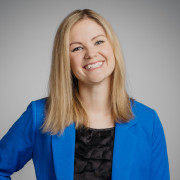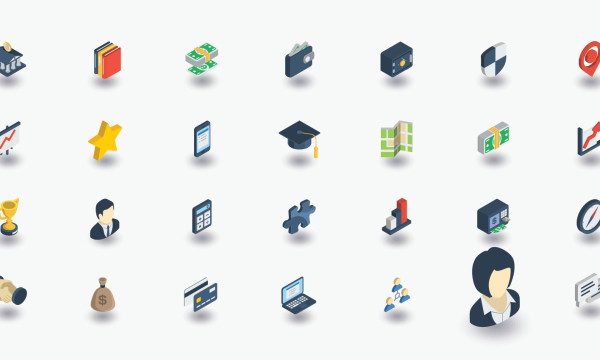Leveling up your bank accounts after college

Once you land your first full-time role out of college, there are a lot of new things to consider. You might be setting up a retirement plan, establishing an HSA or FSA, deciding whether to switch to your employer’s insurance plans for medical, dental, or vision — the list goes on and on. With all these decisions looming on top of your new workload, upgrading your personal bank accounts may fall to the wayside on your list of priorities. However, if you’re able to look at which checking/savings accounts you’re eligible for, you could discover perks (such as higher interest rates) that are free and easy ways to passively grow your finances.
Student accounts
It’s common for high school and college students to use accounts that allow them the space and flexibility to learn how to manage their finances. Perks such as overdraft waivers, one-time cash offers, and ATM fee waivers can be used for extra freedom and forgiveness when learning the ins and outs of banking.
For example, UBT offers the Simply Free Student checking account, created for customers ages 14 to 25. This account is free, with no activity requirement and no minimum opening deposit requirement, making it ideal for first-time banking customers. Plus, you can earn cash bonuses for meeting certain requirements, providing a boost to your new financial journey. The Simply Free UNL checking account is also available exclusively for UNL students. This account offers the same benefits as the regular student checking account, with the added perks of one free “oops” overdraft fee waiver (waives one NSF Paid Item Fee/NSF Returned Item Fee) per calendar year and all non-UBT ATM fees being waived (excluding surcharges ATM owners may assess).
On the savings side of things, UBT also offers the Simply Savings Student account. This is another free account for ages 25 and under with no monthly maintenance fee and no minimum opening deposit required, with six free debit transactions per calendar month and a small $5 fee for each additional transaction. On top of that, you’ll receive a small amount of interest each month on the money in your account.
These accounts are all excellent learning tools that show you the ropes of banking. But once you start earning more money in a full-time role, you may start to desire an account that offers higher interest rates in exchange for taking the training wheels off, so to speak. Once you don’t need the safeguards provided by student accounts, you can take advantage of compound interest to start growing your finances exponentially over time.
What account(s) would be best to transition to?
The best account for you depends on your situation and what you personally value most out of your banking experience. However, if you’re looking for a place to start, here are a few of UBT’s offerings, recommended by our experts.
Checking: Simply Free Plus
With a Simply Free Plus account, there is no age requirement and there are no monthly maintenance or activity fees. Best of all, you can earn substantial interest on the balance in your checking account if requirements are met.* To open, a minimum opening deposit of $1,000 is required, and there are certain activity requirements if you want to be eligible for the best interest rates. For requirements and current interest rates, click here.
Savings: Value Edge Money Market
A money market account is a great option if you’re looking for higher interest rates than those typically offered by traditional savings accounts. Additionally, you can withdraw money at any time, providing flexibility for your savings. To learn more about money market accounts, click here.
UBT’s Value Edge Money Market account requires a minimum opening deposit of $1,000. You can make up to six free debit transactions per statement cycle; for each additional debit transaction, there will be a $25 fee. However, there is no age requirement, and the Value Edge Money Market earns much more interest than a Simply Savings Student account. For requirements and current interest rates, click here.
A certificate of deposit (CD) could be a good alternative to a money market account, depending on your situation and how you’d like to handle your money. CDs allow you to pick a length (usually 6, 12, or 24 months), and for that set amount of time, your money will accumulate at a fixed interest rate — providing you with predictable, calculable passive income. However, once you set that money aside, you won’t be able to access it without penalty until the number of months on your CD has passed. For current CD rates, click here.
How do I open my new account(s)?
If you already have a UBT checking/savings account: We try to make it as quick and easy as possible to transition your account(s). All you’ll have to do is speak to one of our bankers at a branch near you and ask to fill out an account change form.
If you don’t already have a UBT checking/savings account: Use the following links to open a Simply Free Plus account, a Value Edge Money Market account, or apply for a certificate of deposit online today. (Just look for the “Open an Account” or “Open Online” button!) If you have questions about which accounts are best for you, or if you’d prefer to open an account in person, you can always speak to a banker at a UBT location near you.
*Simply Free Plus statement cycle activity requirements: 12 debit card purchases posted (ATM transactions do not apply), receive paperless statements (requires enrollment via online or mobile banking and ongoing valid email address), access online or mobile banking at least once, and one direct deposit posted.
Learning Center articles, guides, blogs, podcasts, and videos are for informational purposes only and are not an advertisement for a product or service. The accuracy and completeness is not guaranteed and does not constitute legal or tax advice. Please consult with your own tax, legal, and financial advisors.




